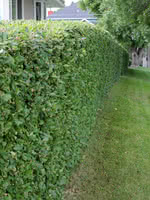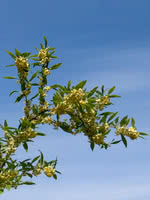Mon-Fri 9am - 5pm Mountain time
Peking Cotoneaster vs Cherry Prinsepia
Cotoneaster acutifolia
Prinsepia sinensis
NOT AVAILABLE THIS SEASON - MIGHT RETURN
CUSTOM GROW
Peking Cotoneaster is a medium-sized shrub that is well adapted to colder climates. Best suited for use as a hedge, Peking Cotoneaster has dark green foliage that turns a stunning reddish orange in the fall.
Hardy fruit guru, Bernie Nikolai (DBG Fruit Growers), has started to recommend grafting hardy pear varieties to Peking Cotoneaster after his experiences were successful and produced fruit faster than other rootstocks. Remember to leave some nurse limbs if you try this.
Cherry Prinsepia is an attractive, cold hardy shrub with thorny stems and a rounded shape.
Primarily used for its shrub and hedge characteristics, Cherry Prinsepia is also grown for its ornamental fruit. Tart in flavor, the red berries are edible and enjoyed by birds and humans alike.
If deer are an issue on your property, try planting Cherry Prinsepia in a tight row to create a dense hedge to deter them.
Peking Cotoneaster Quick Facts
Cherry Prinsepia Quick Facts
In row spacing: 0.3 m (1.0 ft)

